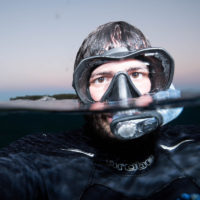Matheus A. Mello-Athayde
PhD candidate
University of Queensland
@https://twitter.com/MMelloathayde

From 2005 to 2022, the main node of the ARC Centre of Excellence for Coral Reef Studies was headquartered at James Cook University in Townsville, Queensland (Australia)








Matheus is a current PhD student and research assistant at the Coral Reef Ecosystems Laboratory from The University of Queensland. Matheus has a double degree in science, Bachelor of Science (teaching degree) and Bachelor of Biological Science with Honours (Marine Biology Major) from Santa Cecilia University (Brazil).
Matheus is a passionate and dedicated marine biologist, wildlife and underwater photographer. He grew up snorkelling the coast of Brazil, learning to appreciate and protect the ocean’s biodiversity. Since he was a teenager, he has been involved with marine science and started to work as an Aquarist and Marine Education Officer on the largest public aquarium in South America at the time (Acqua Mundo, Brazil).
While undertaking his bachelor’s degree, he worked on different scientific projects, including biometric data acquisition and scientific identification on one of the most extensive collections of preserved sharks and rays in Brazil, at the centre of studies of Elasmobranchii, NUPEC. He contributed as a biologist on a centre of rescue and rehabilitation of marine animals at the Gremar Institute, Brazil. While at Gremar he worked on an educational outreach program funded by the Guarujá city council as a teacher for public high schools’ students. He also worked for the University of Sao Paulo as a marine educator and snorkelling guide on a marine ecology outreach project. Matheus had a passion for the zoology of invertebrates, his honours degree project focused on the ecology of rocky shore environments, which led him to start a work internship with corals reefs at the University of Sao Paulo.
He joined the CRE laboratory as an occupational trainee research assistant in January 2011. Since then, he has been working and collaborating on a wide range of scientific projects. He has experience collecting field samples to undertake long-term in-situ and laboratory experiments, laboratory analyses, scientific data collection, statistical analyses, and modelling.
Matheus was awarded a full doctoral fellowship on a research project entitled “Porites cylindrica (Dana, 1846), a resilient coral found on the Great Barrier Reef: present and future coral physiology”. The overall aim of Matheus’s PhD thesis is to understand better how corals with different life-history respond to changes in the present and future abiotic environments. His PhD project utilized the state-of-the-art laboratory automated control system for studying the effects of ocean acidification and warming. His research project was also one of the firsts to incorporate the newest automated underwater incubations system in order to measure in situ calcification and metabolic rates.
The hope for the coral reefs is going beyond finding “super corals” that would be able to resist bleaching and survive stressful thermal events but find corals that also can maintain a higher percentage of coral cover, by growing rapidly upwards to counter sea level rises, maintain high recruitment levels and increase their skeletal density to prevent breakages due to the wave energy that coral reefs might be facing in the future.
Current projects and collaborations
Publications
Web profiles
Main Collaborators
Associate Professor Sophie Dove (The University of Queensland, Australia)
Professor Ove Hoegh-Guldberg (The University of Queensland, Australia)
Dr Selina Ward (The University of Queensland, Australia)
Dr Kristen Brown (University of Pennsylvania, USA)
Professor Amatzia Genin (The Hebrew University, The Interuniversity Institute for Marine Science in Eilat, Israel)
Dr Veronica Radice (Old Dominion University, USA)
Dr Pim Bongaerts (California Academy of Sciences, USA)
New DNA techniques are being used to understand how coral reacted to the end of the last ice age in order to better predict how they will cope with current changes to the climate. James Cook Univer
A new study on the effects of climate change in five tropical countries has found fisheries are in more trouble than agriculture, and poor people are in the most danger. Distinguished Profess
James Cook University researchers have found brightly coloured fish are becoming increasingly rare as coral declines, with the phenomenon likely to get worse in the future. Christopher Hemingson, a
Researchers working with stakeholders in the Great Barrier Reef region have come up with ideas on how groups responsible for looking after the reef can operate more effectively when the next bleaching
Abstract: As marine species adapt to climate change, their heat tolerance will likely be under strong selection. Individual variation in heat tolerance and its heritability underpin the potential fo
Abstract: The Reef Ecology Lab in KAUST’s Red Sea Research Center explores many aspects of movement ecology of marine organisms, ranging from adult migrations to intergenerational larval dispersal
Abstract: Macroalgal meadows are a prominent, yet often maligned component of the tropical seascape. Our work at Ningaloo reef in WA demonstrate that canopy forming macroalgae provide habitat for ad
Abstract: Sharks are generally perceived as strong and fearsome animals. With fossils dating back at least 420 million years, sharks are not only majestic top predators but they also outlived dinosa
Abstract: Connectivity plays a vital role in many ecosystems through its effects on fundamental ecological and evolutionary processes. Its consequences for populations and metapopulations have been
Abstract: Evolution of many eukaryotic organisms is affected by interactions with microbes. Microbial symbioses can ultimately reflect host’s diet, habitat range, and even body shape. However, how
Abstract: The past few years have seen unprecedented coral bleaching and mortality on the Great Barrier Reef (GBR) but the consequences of this on biodiversity are not yet known. This talk will expl